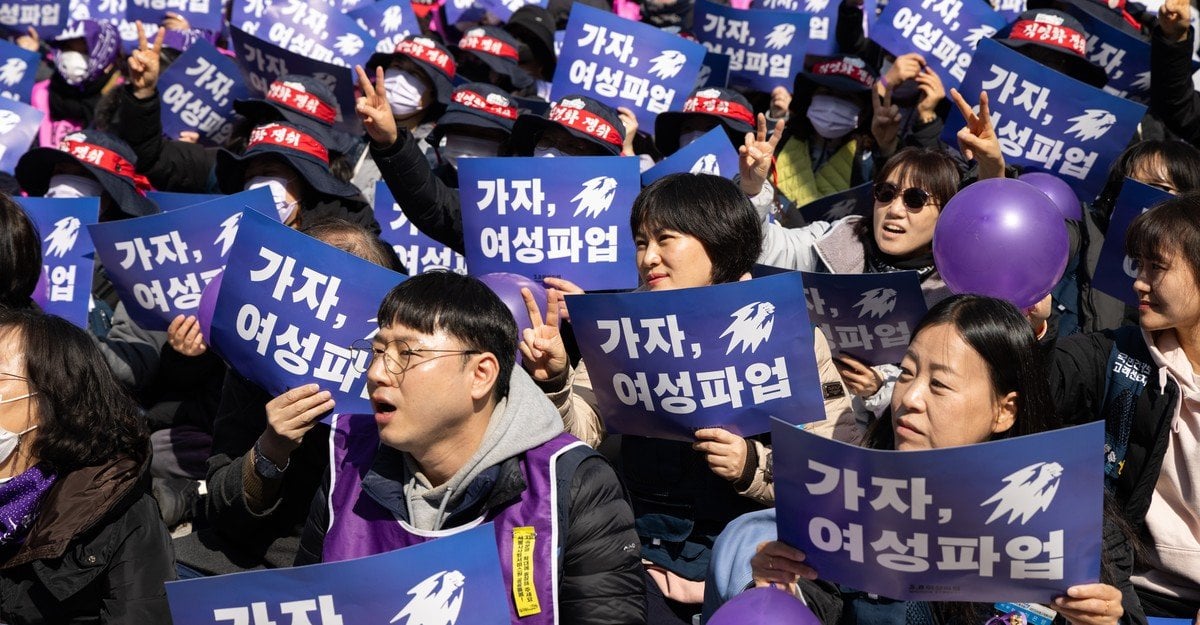
The Anti-Anti-Feminist Election
https://www.theatlantic.com/international/archive/2025/06/feminism-south-korea-elections/682992/?utm_source=reddit&utm_medium=social&utm_campaign=the-atlantic&utm_content=edit-promo
Posted by theatlantic


The Anti-Anti-Feminist Election
https://www.theatlantic.com/international/archive/2025/06/feminism-south-korea-elections/682992/?utm_source=reddit&utm_medium=social&utm_campaign=the-atlantic&utm_content=edit-promo
Posted by theatlantic
2 comments
Arash Azizi: “Opposition to women’s rights has helped fuel authoritarian movements in Russia, Hungary, Brazil, and the United States. That the same is true in South Korea, which is holding an early presidential election tomorrow, is perhaps less well known. There, the role of anti-feminists is particularly stark, helping to put women’s issues at the very center of the country’s fraught contest.
“To appreciate the stakes, recall that just a few months ago, South Korea nearly lost its democracy: On December 3, then-President Yoon Suk Yeol shut down the parliament, banned all political parties, and suspended the free press. His power grab was swiftly defeated by mass demonstrations and a heroic parliamentary effort—members climbed fences to reach the chamber, where they unanimously voted to lift martial law—but the shock remained. Why was a country known for technological prowess, slick horror films, and dreamy boy bands descending into chaos?
“The answer lies in part with the country’s struggle over women’s rights. Even as South Korea has raced ahead economically, gender equality has lagged behind other indicators. Out of 146 countries indexed by the World Economic Forum, South Korea comes 112th in women’s economic participation and 100th in women’s educational attainment (only slightly better than Iran).
“For longer than it has had a democracy, South Korea has had a women’s-rights movement pressing to improve these conditions … In recent decades, women’s rights have advanced steadily, if slowly. Advocates successfully pushed for sexual- and domestic-violence legislation in the 1990s. In 1999, they managed to abolish a system that awarded extra points on civil-service exams to military veterans, who are overwhelmingly male due to South Korea’s male-only conscription. They got rid of the *hoju* family-registration system, which automatically counted men as the heads of households. But legislative advocacy has not eradicated violent crime against women, a grim reality that has spurred a particularly dramatic upsurge in women’s activism in the past 10 years.
“… Yoon was impeached after his aborted December coup, but South Korea’s political crisis did not end there. Only on April 4, when the constitutional court upheld his impeachment, was Yoon formally removed from office. His party is in turmoil over his legacy and only recently settled on its candidate for tomorrow’s election. The Democratic Party is running Lee Jae-myung, the same candidate Yoon faced in 2022, and he is now the front-runner.
“Lee mostly shied away from women’s issues when he ran against Yoon in 2022, but this year, he has promised to empower the gender-equality ministry. In the past, he has rebuked Yoon for claiming that there is no gender inequality in South Korea; he has also promised to reduce the gender-wage gap, strengthen laws against stalking and dating violence, offer free HPV vaccines to adolescents, and establish a system for reporting and monitoring businesses with discriminatory employment practices. Feminists will likely support him to prevent the right’s return to power.
“… With the disarray on the right, Lee stands a good chance of winning the presidency. If he does, he would do well to remember that South Korean democracy will be preserved not by appeasing anti-feminists, but by devising solutions to real problems, such as the cost-of-living and urban-housing crises, that gave an opening to demagogues like Yoon in the first place.”
Read more: [https://theatln.tc/CI9JLDUi](https://theatln.tc/CI9JLDUi)
South Korea has a major issue of legal equality but no social equality, which helps to egg on misogyny but even lower marriage rates than Japan.
Not shocking this leads to a lot of misgony ontop of low birth rates.
Comments are closed.